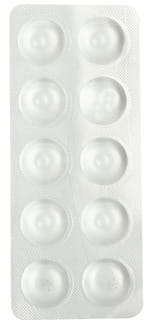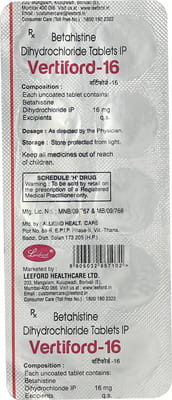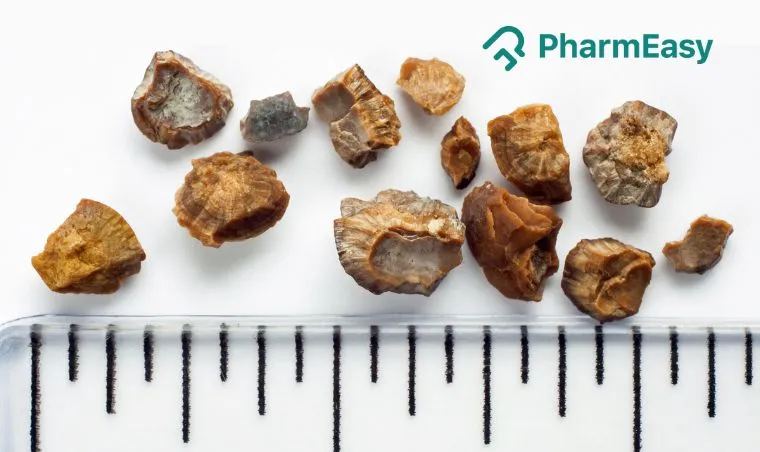Vertiford-16 Tablet
Description
Vertiford 16 tablet is a medication used to treat Meniere's syndrome, a disorder of the inner ear. This condition can cause a range of symptoms, including vertigo (a sensation of spinning), ringing in the ears (tinnitus), hearing loss, and nausea. The active ingredient in this medication is betahistine, which works by improving blood flow to the inner ear and reducing the pressure that builds up there. It's important to use this medication as prescribed by your doctor and for the full duration of the treatment, even if your symptoms improve.
Before taking Vertiford 16, it is recommended that you discuss your medical history with your healthcare provider. It's crucial to inform them if you have any allergies to betahistine or other ingredients in the tablet. You should also tell them about any past or current stomach ulcers, asthma, or a rare tumour called pheochromocytoma. This medication is not recommended for anyone under the age of 18. It is also advisable to exercise caution if you have low blood pressure or suffer from hives, rashes, or hay fever, as this medication may exacerbate these conditions.
Vertiford 16 can be taken with or without food, but it is often recommended to take it after a meal to help prevent any mild stomach discomfort. You should swallow the tablet whole with a glass of water and not crush, break, or chew it. Consistency is key, so try to take it at the same time each day for the best results. If you happen to miss a dose, take it as soon as you remember. However, if it's almost time for your next dose, skip the one you missed and continue with your regular schedule. Never take a double dose to make up for a missed one.
While Vertiford 16 is generally well-tolerated, it's important to be aware of potential side effects, which may include headaches, nausea, vomiting, stomach pain, indigestion, and bloating. If you experience an overdose, symptoms could include nausea, stomach pain, sleepiness, or even more serious complications affecting the lungs or heart. In such a case, you should seek immediate medical attention. It's also important to note that Vertiford 16 can interact with other medications, particularly antihistamines and those used to treat Parkinson's disease. Therefore, always inform your doctor about all the medications and supplements you are currently taking.
Product Summary
| Offer Price | ₹42.75 |
| You Save | ₹32.25 (43% on MRP) |
| Contains | Betahistine(16.0 Mg) |
| Uses | Meniere's disease |
| Side effects | Headache, nausea, vomiting, stomach pain, indigestion |
| Therapy | ANTI-VERTIGO |
Uses
Contraindications
- If you are allergic to Betahistine or any other ingredients of Vertiford 16 tablet.
- If you are suffering from untreated high blood pressure due to a tumour in the adrenal gland (phaeochromocytoma).
Side effects
- Headache
- Nausea
- Vomiting
- Stomach pain
- Indigestion
- Bloating
Precautions and Warnings
Pregnancy
Breast Feeding
Driving
Alcohol
Other General Warnings
- You have asthma.
- You have stomach ulcers.
- You are suffering from low blood pressure.
- You are suffering from hives (urticaria), rashes or hay fever, Vertiford 16 tablet can worsen them.
Directions for Use
- Vertiford 16 tablet should be taken as directed by your doctor.
- Swallow it as a whole with a glass of water. Do not cut, break or chew the medicine.
- It should preferably be taken after having your meal to avoid stomach discomforts.
- It would be best if you take it at a fixed time for optimal results.
- You should not consume it more than that prescribed by your doctor.
Storage and disposal
- Vertiford 16 tablet does not require any specific storage conditions.
- Keep it away from children and pets.
Quick Tips
- Take this medication exactly as your doctor has instructed.
- Swallow the tablet whole with water; do not chew, cut, or crush it.
- Taking the medication with or after food can help reduce stomach discomfort.
- Do not stop taking the medication on your own, even if you feel better.
- This medication is not recommended for use in children under 18 years of age.
- Inform your doctor about any existing health conditions, especially stomach ulcers, asthma, or pheochromocytoma.
- If you miss a dose, take it as soon as you remember, unless it's almost time for your next dose.
- This medicine is not known to cause drowsiness, but the condition it treats can affect your ability to drive, so exercise caution.
Dosage
Overdose
- Excess of this medicine may lead to lung or heart complications.
- Symptoms of an overdose include nausea, stomach pain, sleepiness, vomiting, fits, indigestion, impaired balance or coordination.
- If you think you have had an overdose of this medicine, contact your doctor immediately or visit the nearest hospital.
Missed a Dose
Mode of Action
How Does It Work?
Interactions
Interactions with other medicines
- Vertiford 16 tablet may interact with other medicines, discuss with your doctor about all the medicines, supplements or herbal preparations you are taking. Also, you should inform your doctor if you have a planned surgery or vaccination scheduled....
- Concomitant use of Vertiford 16 tablet along with medicines used to treat allergies, called anti-histamines. This medicine can affect how your allergy medicines work and allergies can worsen.
- Medicines like Selegiline (used to treat your mental health), medicines used to treat Parkinson's disease, should be used with caution along with Vertiford 16 tablet.
Interactions with food items
Content Details
Dr. Arpit Verma
MBBS, MD, CCEBDM Diabetology
Dr. Ritu Budania
MBBS, MD (Pharmacology)
Frequently Asked Questions (FAQs)
Q: What is Vertiford 16mg tablet used for?
Q: How to take Vertiford 16mg tablet?
Q: How long can I take Vertiford 16mg tablet?
Q: Does Vertiford 16mg tablet cause drowsiness?
Q: Can I stop taking Vertiford 16mg tablet on my own?
Q: Is Vertiford 16mg tablet habit-forming?
Q: What should be discussed with my healthcare professional before I start the treatment with this medicine?
Q: We are planning to travel to a hilly region, my child gets motion sickness, can I give Vertiford 16mg tablet to my child?
References
Did you find this medicine information helpful?
Please rate your experience





















